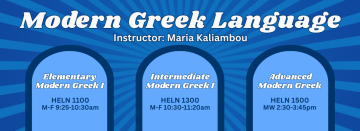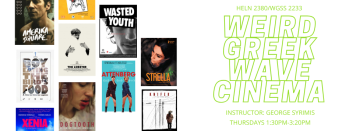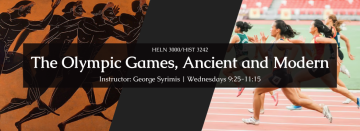Fall 2025 Courses

Elementary Modern Greek I
Instructor: Maria Kaliambou
HELN 1100
Monday-Friday 9:25-10:15
An introduction to modern Greek, with emphasis on oral expression. Use of communicative activities, graded texts, written assignments, grammar drills, audiovisual material, and contemporary documents. In-depth cultural study.
Intermediate Modern Greek II
Instructor: Maria Kaliambou
HELN 1300
Monday-Friday 10:30-11:20
Further development of listening, speaking, reading, and writing skills in modern Greek. Presentation of short research projects related to modern Greece.
Advanced Modern Greek
Instructor: Maria Kaliambou
HELN 1500
Monday, Wednesday 2:30-3:45
Advanced language course intended to further develop reading, writing, speaking, and listening skills, while sharpening students’ sensitivity toward modern Greek culture.

The Greater War (1911-1923)
Instructor: Charalampos Minasidis
Tuesday 1:30-3:20
HELN 2230/HIST 2231/PLSC 3144
The concept of the Greater War expands the chronological and geographical scope of the study of the Great War (1914–1918). It focuses on the social, economic, political, and cultural developments that either influenced or were a direct consequence of the Great War. It includes all conflicts and fronts from the Italian-Ottoman War of 1911 and the Balkan Wars of 1912–1913 that initiated a new era of imperialism and nationalism with weaker empires as victims, to the mobilization of states and people across the globe from 1914 onwards, the continuation of the violence after 1918, up until the end of the Russian Civil War and the compulsory population exchange between Greece and Turkey in 1923 that marked a new era for the relationship between states and their citizens. The seminar offers a “from above” and a “from below” view of the Greater War, examining how the war influenced, shaped, and reshaped both the states and their societies. It aims to familiarize the students with its fundamental chronology, events, and actors by exposing them to the new historiography of war, its questions, and concepts.

Weird Greek Wave Cinema
Instructor: George Syrimis
HELN 2380/WGSS 2233
Thursday 1:30-3:20
The course examines the cinematic production of Greece in the last fifteen years or so and looks critically at the popular term “weird Greek wave” applied to it. Noted for their absurd tropes, bizarre narratives, and quirky characters, the films question and disturb traditional gender and social roles, as well as international viewers’ expectations of national stereotypes of classical luminosity–the proverbial “Greek light”–Dionysian exuberance, or touristic leisure. Instead, these works frustrate not only a wholistic reading of Greece as a unified and coherent social construct, but also the physical or aesthetic pleasure of its landscape and its ‘quaint’ people with their insistence on grotesque, violent, or otherwise disturbing images or themes (incest, sexual otherness and violence, aggression, corporeality, and xenophobia). The course also pays particular attention on the economic and political climate of the Greek financial crisis during which these films are produced and consumed and to which they partake.

The Olympic Games, Ancient & Modern
Instructor: George Syrimis
HELN 3000/HIST 3242
Wednesday 9:25-11:15
Introduction to the history of the Olympic Games from antiquity to the present. The mythology of athletic events in ancient Greece and the ritual, political, and social ramifications of the actual competitions. The revival of the modern Olympic movement in 1896, the political investment of the Greek state at the time, and specific games as they illustrate the convergence of athletic cultures and sociopolitical transformations in the twentieth century.

The Age of Revolutions
Instructor: Charalampos Minasidis
HELN 3050/HIST 2251/PLSC 3470
Wednesday 1:30-3:20
This seminar examines the “dual revolution,” namely the industrial and political revolutions of the late 18th and early 19th centuries that reshaped the world. It investigates the Age of Revolution in historical perspective by focusing on selective cases from the American and French Revolutions to that of Greece, Haiti and the unsuccessful ones of 1848. It studies their origins, their impact, and their legacies. It examines the emergence of republicanism, constitutionalism, nationalism, capitalism, socialism, feminism and the movements and political projects these ideas formed across Europe and North America. The seminar offers a “from above” and a “from below” view of the Age of Revolution, examining how it influenced, shaped, and reshaped both the states and their societies. It aims to familiarize the students with its fundamental chronology, events, and actors, by exposing them to the new historiography, its questions, and concepts.